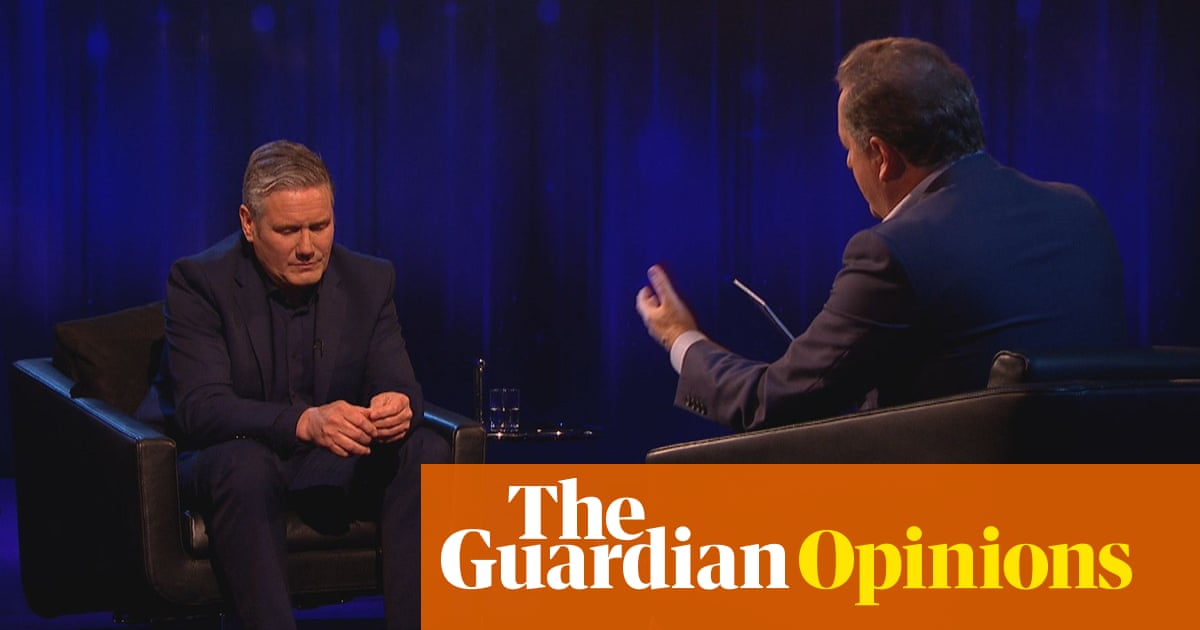The real Keir Starmer – tears, blokey bonding and no politics - 5 minutes read

“Why are you doing this?” asked Piers Morgan. A good question. Why does anyone agree to do Piers Morgan’s Life Stories (ITV) unless they have an ulterior motive? Why put yourself through the ordeal of an ersatz This is Your Life therapy session with an interviewer whose eyes are firmly fixed on ratings fodder and has little concern for your mental wellbeing? So best to get the elephant out of the room first.
Keir Starmer smiled nervously and joked about this being the first time he had had an opportunity to talk to a live audience since becoming leader of the Labour party. But we all knew that was only a half-truth. The real reasons he was there were the opinion polls that showed Labour consistently behind the Tories, the recent disastrous local election results and voters saying they didn’t know much about what made Starmer tick.
So this was Keir’s chance to try to connect with a few million people. To show them the real him. And by and large it made for worthwhile viewing, with both men getting pretty much what they wanted out of the show, along with some blokey bonding over their shared passion for Arsenal. Morgan got a few nice insights – not to mention the money shot of a few tears – while Starmer came across as a thoroughly decent man with the occasional good line in self-deprecation.
The opening exchanges, though, were fairly lame, the highlights of which were Starmer admitting he didn’t like his middle name of Rodney – he even got it written out of his marriage certificate – and that he used face moisturiser. Hardly groundbreaking stuff. But things picked up when Morgan turned shrink and moved on to his relationship with his parents.
Keir’s mum, a nurse named Jo, suffered from Still’s disease and was in and out of hospital throughout his life as her condition deteriorated. By the time she died in 2015, just before Starmer was first elected as an MP, she had had both legs amputated, had lost the use of her hands and couldn’t speak. Starmer’s voice cracked as he expressed his regret that his own children never got to know her properly. And there were tears in his eyes when he said that the one conversation that he would like to have had with her was one in which he told her: “I love you.”
His toolmaker father, Rodney – hence Keir’s middle name – was an altogether more complex man and Starmer admitted that his relationship with him had been difficult and distant. The only time his dad told him he was proud of him was when he passed his 11-plus. You couldn’t help feeling that Starmer’s long history of overachievement – a first from Leeds, a master’s from Oxford, a stellar career in the law which led to him becoming director of public prosecutions and then a Labour MP – was in part driven by a need for his father’s approval. Though even if Rodney had lived to see Keir become leader of the Labour party, you got the feeling he probably would have still withheld his sense of pride.
There was little doubt that Starmer’s was an unusual childhood. His parents only got a black-and-white TV when his mother signed up to an Open University course in the 70s and Keir had to fight to watch Match of the Day on a Saturday night. He also formed his own “gang of four”, the East Surrey Socialists, with three of his mates and they would spend their weekends trying to find events where they could heckle their local MP, Geoffrey Howe. Imagine. Shades of Citizen Smith.
It was left to various friends – in pre-recorded film clips – to make the case for Keir as “a party animal” and the “life and soul” of any gathering. Almost as if they were trying to fill in the crucial, human gaps. To provide a glimpse of the Interesting Keir that Starmer might not be able to access for himself. The man whose true passions could only be observed close up in 90 minutes of football.
Morgan pounced. His one slightly tricky question in an otherwise soft interview. So had he ever had a cheeky spliff or taken any other drugs? Time and again, Starmer refused to give a straight answer. “I haven’t said no,” he mumbled eventually. It was all so pointless, as a simple yes would have done. After all, no one really gives a toss about a politician’s previous any more. If they did, then Boris Johnson would struggle to explain away a phone call to Darius Guppy.
After that there were more tears with the deaths of his father, father-in-law and the family dog – there was a lot of death in the 45-minute interview – along with a surreal aside about a real-life Keir Starmer impersonator who had conned a couple of women from the Sunday Times lonely hearts column, and some touching words about his wife. What there wasn’t was any politics.
Not that Morgan didn’t ask about the current state of the Labour party, more that he appeared to have no real interest in hearing any answers. No sooner had Starmer lapsed into standard political generalisations about talking to the country and his three priorities being education, the economy and social care, than Piers interrupted. Would he raise taxes? No scrub that, what would he say to Boris?
“I’d say: ‘Move over,’” Starmer said tamely. And if he was on a football pitch, he’d knock him over. If only. The Labour benches long for Keir to stop being so polite and pick up a yellow card for a studs-up professional foul on Boris at prime minister’s questions. And that was that. There was only so much catharsis both men could take for one day.
Source: The Guardian
Powered by NewsAPI.org